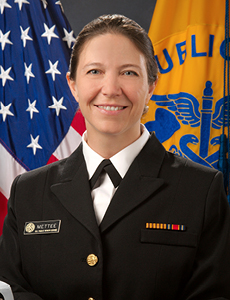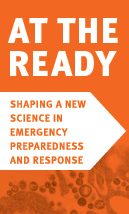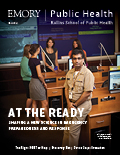The Right SORT of Help
Students provide extra hands in emergencies

Shauna Mettee 09MSN/MPH |
In 1996, a disgruntled laboratory worker intentionally sickened several people at St. Paul Medical Center in Dallas. Twelve co-workers became ill after eating baked goods infected with a rare strain of Shigella, which causes dysentery.
Shauna Mettee 09 MSN/MPH, then an Emerging Infectious Disease Laboratory Fellow at the CDC, accompanied the agency’s investigative team to the scene. During that time, she gained experience and formed relationships that would later benefit her and other RSPH students.
More than 10 years later, she joined Rollins’ Student Outbreak and Response Team (SORT), a volunteer group trained to assist with local outbreak investigations and emergency preparedness. Formed in 2002, SORT was the brainchild of Sara Forsting 01MSPH, then an epidemiologist with the DeKalb County Board of Health Center for Public Preparedness. Rollins Professor Ruth Berkelman supported the idea. The program took off as students took the lead to improve community health in partnership with local and state experts.
|
|
In 2008, Mettee began thinking about how to broaden SORT’s scope. With Berkelman’s encouragement, Mettee and SORT co-leader Amy Williams 09MPH reached out to the CDC. Ian Williams, chief of the Outbreak Response and Prevention Branch, advocated for the collaboration, which included obtaining CDC badges for the entire team—an essential asset when SORT’s 40 members are asked to work at the agency during outbreak responses.
To date, 200 students have participated in SORT. All are trained in disaster preparedness through the National Incident Management Command System and are certified as Red Cross disaster volunteers. Students often take elective courses at Rollins, such as Public Health Preparedness and Bioterrorism, co-taught by Berkelman and global health Professor Phil Brachman (who investigated inhalational anthrax during the 1950s), and Emerging Infectious Diseases, co-taught by Berkelman and Ali S. Khan 00MPH. FBI instructors provide bioterrorism training, and Khan leads training in the CDC’s Emergency Operations Center (EOC).
Last year, SORT members helped staff the EOC during outbreak investigations of cholera in Haiti and cases of Salmonella Montevideo traced to Italian meat spices. Locally, they assisted DeKalb County with a flu immunization clinic and a MARTA disaster drill. Students also attended a national summit on public health preparedness and sponsored activities at Rollins, including a tour of Emory’s mock BSL-4 laboratory. Daniel Brencic and Carrie McNeil, current co-presidents of SORT, plan to broaden its relationships further.
Students carry their SORT experiences with them after graduation. Heidi Moline 10MPH, an associate analyst with the Union of Concerned Scientists in Washington, D.C., leads a project looking at how science is maintained and used in decision-making during disasters. At the CDC, Williams helped create a toolkit that U.S. health departments use to assess the needs of reproductive-age women affected by disasters. Mettee served two years as a CDC Epidemic Intelligence Service officer and is now a CDC Preventive Medicine Fellow assigned to work with three local county health departments.
Her assignment, she says, “will be the perfect synergy of my experience with SORT—combining the federal and local county public health perspective and developing and applying more leadership skills.”—Pam Auchmutey


